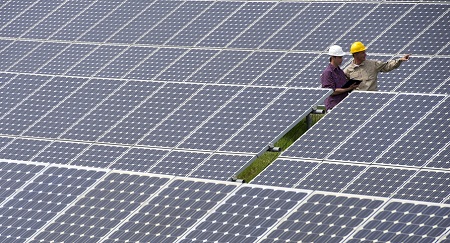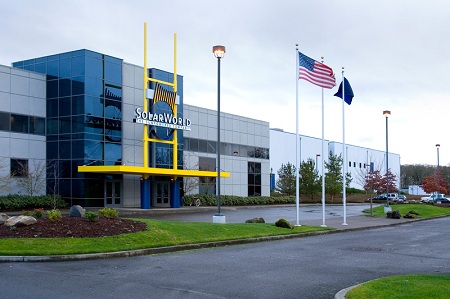The group fighting SolarWorld’s bid for duties on Chinese-manufactured crystalline photovoltaic cells and modules on Monday released a report that claims protectionist measures would result in between 14,000 and 60,000 fewer American jobs than would otherwise exist by the end of 2014—but that wasn’t the only news in the solar trade battle.
SolarWorld claimed a victory of its own as the U.S. Department of Commerce ruled that a surge in Chinese imports since the company filed its trade petition in October constituted “critical circumstances.” That means that if the government rules in SolarWorld’s favor on March 2 on the company’s countervailing duties claim, the duties would be applied retroactively to early December. SolarWorld is seeking duties of more than 100 percent in response to both alleged illegal Chinese subsidies and dumping of products at below cost.

SolarWorld said the critical circumstances ruling was unprecedented, and came in response to evidence put forth by the company that showed a “massive, evasive surge of Chinese solar cell and panel imports ahead of Commerce’s first preliminary determination on duties.”
This decision by Commerce was revealed in a letter to SolarWorld dated Monday, stepping on the toes a bit of the Coalition for Affordable Solar Energy (CASE) and its jobs report put together by the Brattle Group consultancy. CASE chief Jigar Shah said the report showed the “devastating” effect that SolarWorld’s “anti-China crusade” would have on employment in the United States.
According to the report [PDF], duties of 100 percent would drive up PV prices and cost consumers at least $698 million. That would eliminate between 16,917 and 49,589 American jobs over the next three years, depending on the response to the higher prices. The impact of even a 50 percent duty would be nearly as great, the report said, resulting in net consumer losses of at least $621 million and job losses between 14,877 and 43,178. The report said that another 10,000 jobs could be lost if China retaliated to duties by slapping tariffs on imports of U.S. polysilicon.
“This is an eye-opening analysis,” said Shah, who claims CASE represents “97 or 98 percent” of the solar industry. “Even after accounting for job gains in solar cell manufacturing, the likely job losses in the rest of America’s solar industry and economy are staggering.”
The job loss figures cited include those resulting from the direct and indirect impacts of a decline in solar investment, as well as a decline in what economists call “induced effect”—the economic activity that results when the increased earnings generated by the direct and indirect economic activity is spent on local goods and services.
So not all the jobs in these totals would be in the solar industry, which absent duties is projected to grow from around 100,000 employees to around 124,000 by next year. And even with duties the solar industry might not actually shrink, the report said, as slower but continued growth in installations and increased cell and module production jobs to some extent offset jobs lost because of the tariffs. The report estimates that a 50 percent duty “would create around 6,712 to 13,032 new jobs from an increased module manufacturing market share by 2014.”

“We’re not saying tariffs will shut down the U.S. industry,” the report’s lead author, Mark Berkman, said at a news conference. “But there will be a substantial delay in installations, and slower growth for the industry, as a consequence of pushing up costs.”
The Coalition for American Solar Manufacturing (CASM), which includes SolarWorld and six unnamed companies that joined it in seeking protections, responded that it was every bit as concerned about U.S. jobs as CASE.
“This highly speculative study ignores the illegality of China’s actions and fails to consider the harm those actions have caused to high-tech manufacturing jobs in the solar sector,” SolarWorld’s Gordon Brinser, who doubles as head of CASM, said in a statement emailed to reporters. “We do know that thousands of good-paying American manufacturing jobs have already been lost to illegal Chinese dumping and subsidies for solar products.”
The Commerce Department’s decision on whether to levy countervailing duties to offset the effects of any illegal subsidies was originally scheduled to be made in January but then was pushed back to Feb. 13 and then again to March 2. The agency is scheduled to issue a separate preliminary ruling on anti-dumping duties on March 27.